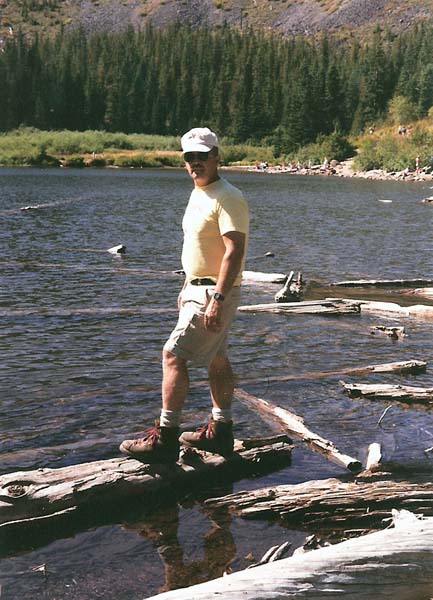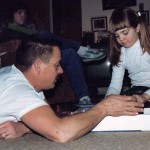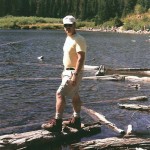Today Mom and I moved Dad into a memory care facility.
 I took the day off work and drove down to Lincoln City first thing to help Mom. I figured if nothing else, I could be a pack mule. On the drive I stopped at a little coffee shop; it had the most beautiful white lavendar in front of it. I need to find some of this!
I took the day off work and drove down to Lincoln City first thing to help Mom. I figured if nothing else, I could be a pack mule. On the drive I stopped at a little coffee shop; it had the most beautiful white lavendar in front of it. I need to find some of this!
Upon arrival, my first job was taking Dad to NESS to hang out for the day while Mom and I got his room in order. When I got back, Mom’s friend had taken the load of heavy stuff, so we loaded up the last of the lighter stuff and headed out.
When we got to Dad’s new residence, the day unfolded as I expected. One person after another came to Mom to ask questions about Dad’s care, abilities, and routine; I played pack mule and general dog’s body.
While I was tired when it was finally time to go get Dad, the emotional part of the day was really just beginning.
Just so you know, this is how I see my dad. This is Dad.
In the last few years I’ve seen my dad in several hospitals, struggling to walk, and sleeping a lot. That’s not Dad.
While we were setting up his room, in a complex surrounded by other residents, it was disheartening to recognize my “new dad” in a lot of those behaviors: the trembling hands, the slurred speech, the hallucinations, People who haven’t dealt with dementia/Alzheimer’s think of this disease as memory lost. That’s really not what it’s about.
It’s about a loss of dignity. A loss of vibrancy. A loss of self.
I will never see my dad again; he helped me roof my first house, catch fish, and learn to garden. Instead I will watch “new dad” sink further into immobility, confusion, and dependence.
While this is hard on me–and Dad–I know it’s even harder on Mom. She has done her level best to keep him at home and has given up so much of her life to keep him at home. But it’s like a scale; there comes a point when you can no longer give enough of yourself to keep the scales even. I know of at least two 911 calls because Dad had fallen and she couldn’t get him up. I don’t know how many tons of laundry she’s done in recent years for him. I don’t know how many times she’s explained that the cats and dogs and rabbits he sees around the house aren’t really there. I don’t know how many things she’s purchased to try to make his life a little better. “I said for better or worse,” she says.
When Mom finally went to pick up Dad from NESS and bring him to his new home, I watch him walk into the complex. It has a security code that he won’t ever figure out, even though it’s printed right underneath the keypad. The windows only go up about three inches for security. It’s a little like prison (though a nice, clean, and friendly one.)
I asked Dad how he was doing, and he responded, “Tara, to tell you truly, I’m confused.” And he went into his room and sat down and basically refused to answer more questions or accept our help.
The next few weeks are going to be tough and I hope everyone survives.
Before we left, we walked Dad out to get him set up for dinner. He told mom he didn’t like it and wasn’t going to get used to it, and an expression crossed his face that was just heartbreaking.
If only I had a magic wand.





Tara, I’ve been there (with both parents) and I know how tough it is, but it is the right thing now. Your mom won’t ever stop worrying about Don or wanting to take care of him, but he is beyond her abilities now. She has to see to her own needs now and trust that she has done the best she can for him. You, also, need to accept that the Daddy you remember will live on in your memory, but the Dad you now see is not the same person and never will be again. You are right: you will never see your dad again as he was. You can learn to appreciate the man he is now; there are still some moments of joy ahead. It will be a struggle, especially for you as an “only,” but life does go on. Will have the three of you in my prayers. Love – MM
If I had a wand I’d give it you. Failing that, I don’t know how much you know about my mom’s situation until a year ago, so I’m going to share what happened in hope that maybe your Dad could benefit.
My mother’s geriatric neurologist noticed a difference between 2011’s MRI and 2013’s. A really *small* – or therapeutically insignificant – difference. But based on that and the fact that mom’s Alzheimer’s wasn’t progressing along normative lines, she suggested we have mom undergo a spinal tap test to see if perhaps there was too much spinal fluid in the brain.
Positive diagnosis was made of “Normal Pressure Hydroencephaly” (NPH). In English, Water on the Brain.
The thing is that NPH presents with symptoms identical to Alzheimer’s. The pressure build-up of fluid in the brain kills brain cells making dark areas on MRI’s which is the only way we currently have of assigning a dementia diagnosis in the presence of dementia symptoms. Besides dead cells, the fluid pressing on other areas because it can’t get out properly causes the same confusion, loss of memory, personality changes, etc. which are typical of Alzheimer’s. Oh, and NPH is fatal.
NPH is not on most doctors’ radar while everyone thinks the problem is Alzheimer’s. By the time it’s considered, the individual is usually already confined to a wheelchair and remedial surgery to drain the excess fluids daily via a shunt implant may or may not relieve/reverse the symptoms because the problem was untreated for so many years.
We got lucky. Turns out though Mom definitely has dementia, it’s now thought unlikely she has Alzheimer’s. She had the shunt implanted March 2013 and within 2 weeks was walking without her cane, able to focus on conversations (tracking) and her aphasia all but disappeared. As time progressed she regained other abilities bit by bit. So far, she’s improved so much she is able to drive again. There have been issues with getting the shunt properly adjusted to remove the right amount of fluid which causes some symptoms to increase until the adjustment can (usually) remedy the problem.
It took 7 years for NPH to be considered and diagnosed. Some things haven’t changed, like when she’s tired mom loses the thread in conversation, doesn’t ‘get’ a joke and can’t recall short-term happenings/talks.
The NPH diagnosis was very much like a magic wand for her and us. Her life has resumed it’s dignity and we’re relieved of so much caregiving, grief watching her knowledge of her losses and agonizing over when more deterioration will begin. Perfection it’s not and some of the damage she already suffered is permanent, but the certain death penalty has been revoked.
Obviously I don’t know if your Dad’s doctors have already looked at NPH as a potential diagnosis. However, if they haven’t it’s something to check out, and I’d really hate myself for not sharing what I’ve learned in case it might help you all.